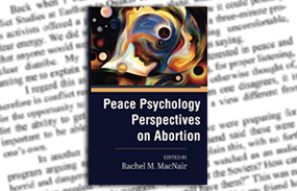.jpg)
Swedish Investigation Focuses on the Male Partners of Women who Elect to Abort
An interesting and unique study was recently published by Swedish investigators who sought to identify risk factors for men who have the repeated experience of being the partners of women who choose to have an induced abortion. A sample of 590 Swedish men were surveyed concerning basic demographics, lifestyle, history of abuse, mental well-being prior to pregnancy and after abortion, emotional support, participation in the abortion decision, men’s experience of care related to the abortion, and men’s opinions as to what societal factors might have prevented the abortion. The men were instructed to return the surveys within four weeks after the abortion occurred.
The following independent risk factors for men having repeat abortion experiences with their partners were identified: psychological, physical or sexual abuse in the last year, being unemployed or on sick leave, and being a parent. Researchers concluded that "Men are marginalized in preventive work and there is little focus on men’s needs and responsibilities in relation to unintended pregnancies," (p. 215).
Makenzius, M., Tyden,T., Darj, E. & Larsson, M. (2012). Risk factors among men who have repeated experience of being the partner of a woman who requests an induced abortion. Scandinavian Journal of Public Health, 40, 211-216.
Chinese Study Investigates Impact of Prior Abortion on Psychological Symptoms during a Subsequent Pregnancy
This large-scale study involved 6,887 women, 3,264 of whom had a history of at least one abortion. Spontaneous abortion was experienced by 8.3% of the women while 41.6% of them experienced induced abortion. Compared to women with no history of abortion, those who had a prior induced abortion were significantly more likely to report cases of anxiety as well as cases of depression during the first trimester of a subsequent pregnancy. No significant differences in anxiety or depression cases were observed when comparing women who had experienced a spontaneous abortion and those with no abortion history. Authors concluded that their findings "suggest women who have experienced a previous induced abortion have omnipresent anxiety and depression symptoms during a subsequent pregnancy, especially during the first trimester," (p. 51).
Huang, Z., Hao, J., Su, P., Huang, K., Xing, X., Cheng, D., Xiao, L., Xu, Y., Zhu, X. & Tao, F. (2012). The impact of prior abortion on anxiety and depression symptoms during a subsequent pregnancy: Data from a population-based cohort study in China. Bulletin of Clinical Psychopharmacology, 22 (1), 51-58.
French Study Examines PTSD and Psychological Distress from either Medical or Surgical Abortions
The findings of this study corroborate existing research on the mental health risks of abortion, particularly, Posttraumatic Stress Disorder (PTSD). The study also examined whether the type of abortion had an impact on women’s experiences. Eighty-six women who were 12 weeks pregnant or less were assessed a few hours (T1) following the abortion and six weeks later (T2). Eleven percent of the participants were women under age 18. Most women had a surgical abortion (63%) as opposed to a medical abortion (37%). Standardized mental health instruments were employed to assess PTSD, social support, anxiety and depression, dissociation and grief.
The findings supported the potential traumagenic nature of induced abortion. At T2, more than one out of three women (38%) reported possible PTSD; this rate is higher than that reported in other studies of PTSD and abortion. Also, as a point of comparison, another French study reported a PTSD prevalence of 2.9%-5% for women carrying to term.
Denis, A., Parant, O. & Callahan, S. (2011). Post-traumatic stress disorder related to birth: A prospective longitudinal study in a French population. Journal of Reproductive and Infant Psychology, 29 (2), 125-135.
Peritraumatic dissociation and peritraumatic emotions of anxiety and depression immediately following the abortion were the main predictors of the intensity of PTSD symptoms at T2. Other adverse post-abortion outcomes were: anxiety (33%) and depression (28%) with scores decreasing from T1 to T2. However, grief persisted throughout the study period. Bereavement and grief were stronger among women who aborted on their own by taking an abortion pill.
Compared to surgical abortion, medical abortion was associated with an increased risk of developing a possible PTSD. This is noteworthy given that 17% of US abortions are medical abortions. According to the results here, the type of abortion seems to have an impact on the experience of abortion, but not on the reaction and support of family and friends. The researchers concluded: "Abortion is therefore an event which may not have time-bounded consequences."
C. Rousset, C. Brulfert, N. Séjourné, N. Goutaudier & H. Chabrol (2011): Posttraumatic Stress Disorder and psychological distress following medical and surgical abortion. Journal of Reproductive and Infant Psychology, 29 (5), 506-517.




.jpg)